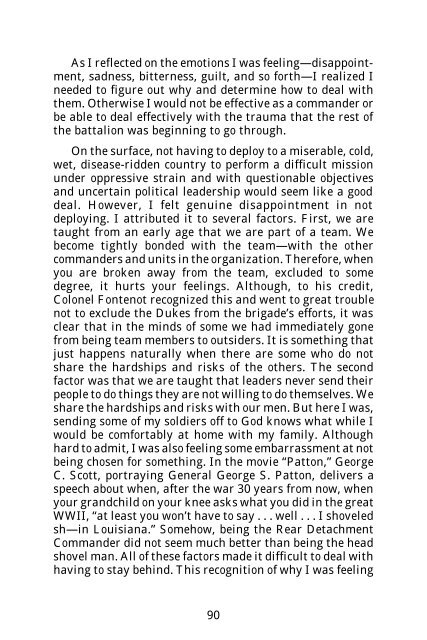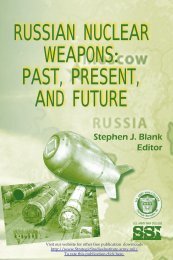Warriors in Peace Operations - Strategic Studies Institute - U.S. Army
Warriors in Peace Operations - Strategic Studies Institute - U.S. Army
Warriors in Peace Operations - Strategic Studies Institute - U.S. Army
You also want an ePaper? Increase the reach of your titles
YUMPU automatically turns print PDFs into web optimized ePapers that Google loves.
As I reflected on the emotions I was feel<strong>in</strong>g—disappo<strong>in</strong>tment,<br />
sadness, bitterness, guilt, and so forth—I realized I<br />
needed to figure out why and determ<strong>in</strong>e how to deal with<br />
them. Otherwise I would not be effective as a commander or<br />
be able to deal effectively with the trauma that the rest of<br />
the battalion was beg<strong>in</strong>n<strong>in</strong>g to go through.<br />
On the surface, not hav<strong>in</strong>g to deploy to a miserable, cold,<br />
wet, disease-ridden country to perform a difficult mission<br />
under oppressive stra<strong>in</strong> and with questionable objectives<br />
and uncerta<strong>in</strong> political leadership would seem like a good<br />
deal. However, I felt genu<strong>in</strong>e disappo<strong>in</strong>tment <strong>in</strong> not<br />
deploy<strong>in</strong>g. I attributed it to several factors. First, we are<br />
taught from an early age that we are part of a team. We<br />
become tightly bonded with the team—with the other<br />
commanders and units <strong>in</strong> the organization. Therefore, when<br />
you are broken away from the team, excluded to some<br />
degree, it hurts your feel<strong>in</strong>gs. Although, to his credit,<br />
Colonel Fontenot recognized this and went to great trouble<br />
not to exclude the Dukes from the brigade’s efforts, it was<br />
clear that <strong>in</strong> the m<strong>in</strong>ds of some we had immediately gone<br />
from be<strong>in</strong>g team members to outsiders. It is someth<strong>in</strong>g that<br />
just happens naturally when there are some who do not<br />
share the hardships and risks of the others. The second<br />
factor was that we are taught that leaders never send their<br />
people to do th<strong>in</strong>gs they are not will<strong>in</strong>g to do themselves. We<br />
share the hardships and risks with our men. But here I was,<br />
send<strong>in</strong>g some of my soldiers off to God knows what while I<br />
would be comfortably at home with my family. Although<br />
hard to admit, I was also feel<strong>in</strong>g some embarrassment at not<br />
be<strong>in</strong>g chosen for someth<strong>in</strong>g. In the movie “Patton,” George<br />
C. Scott, portray<strong>in</strong>g General George S. Patton, delivers a<br />
speech about when, after the war 30 years from now, when<br />
your grandchild on your knee asks what you did <strong>in</strong> the great<br />
WWII, “at least you won’t have to say . . . well . . . I shoveled<br />
sh—<strong>in</strong> Louisiana.” Somehow, be<strong>in</strong>g the Rear Detachment<br />
Commander did not seem much better than be<strong>in</strong>g the head<br />
shovel man. All of these factors made it difficult to deal with<br />
hav<strong>in</strong>g to stay beh<strong>in</strong>d. This recognition of why I was feel<strong>in</strong>g<br />
90
















